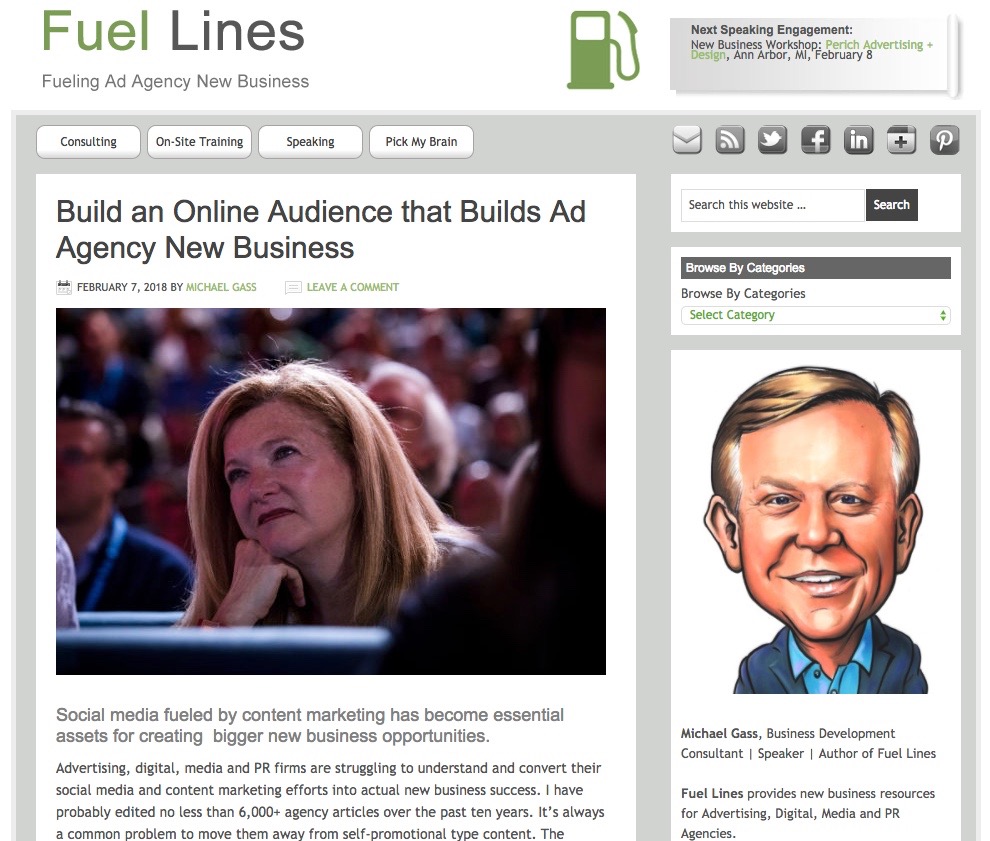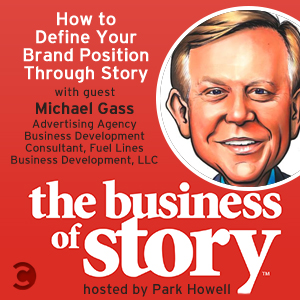I’ve learned the importance of creating my personal brand story when I launched my own consultancy a decade ago. I had led new business for a number of advertising agencies before deciding to start my own consulting firm. This could have easily been one of the worst decisions of my life.
My advertising career had been spent working in only two markets, outside of Birmingham, Alabama and Nashville, Tennessee, I had zero awareness. Little did I know that I was about to start my new business at the beginning of one of the longest economic downturns since the Great Depression.
Social media fueled by content marketing is what helped me to share my story and grow my online audience and increase website traffic to provide me with a continuous pipeline of leads.
When I started my consultancy, social media was only beginning to evolve as a new communication channel. Most agencies weren’t even participating. They thought it was only a fad fueled by the recession and that it would blow over when the economy came back and agency life would return to normal. But as you know, that didn’t happen.
The rise of social media also began the dramatic paradigm shift for business development. The battle for new business quickly moved online. Interruption tactics of the past quickly became ineffective. Prospects were in control. This began the shift away from the interruptive tactics of the past, such as cold calling, to more of an inbound marketing approach preferred by most potential clients.
“It was now more important to be found than to chase new business.” – Michael Gass
I was the first new business consultant for advertising agencies to adopt social media. My blog, Fuel Lines, has ranked among the top 100 global marketing blogs in the world, according to Ad Age’s Power 150. My Fuel Lines newsletter has over 33,000 subscribers. I’ve also amassed more than 107,000 Twitter followers.
From my home base outside Birmingham, Alabama, I’ve built an international consultancy. I have personally trained over 300 agency CEOs and their senior management teams in all 50 states and agencies in over 21 foreign countries. Every single client found me and initiated a call.
Through my personal experience and working with clients, I’ve discovered how important it is for the agency owner to be the face of their company. Given the rise of social media, their personal brand story is as essential, or even more so, than the company’s brand.
Take a look at personal branding from a prospective client’s perspective:
- Humanizing the company
- Improving employee communications
- Building media relations
- Sharing company news and information
- Improving the company’s reputation
- Enhancing credibility
- Attracting the right kind of employees
- Sharing social responsibilities and causes
Growing your personal brand is also made much easier through social media and content marketing.
Four simple steps to advance your personal brand story:
1. Community Development Comes Before Business Development
One of the most significant changes to new business is that audience development is now a core marketing responsibility. You grow your personal brand by identifying and developing a targeted online audience.
Audience development comes before business development.
There should be a significant shift in your thinking. You need to embrace audience building as an important new business initiative and provide the necessary time and resources to build your online community of prospective clients.
2. Learn to Be of Value
Here’s a crucial tip for building your online community of prospects: Stop trying to sell your company. It’s not about touting your credentials, capabilities and case studies. You will never build an audience without value.
Value is simply being of service. You identify the needs of your potential clients and then create and share information that is relevant to their challenges. You must be willing to share your expertise freely.
This is the secret sauce of success in social media and growing your personal brand. Spend more of time thinking about them than about yourself.
“Stop interrupting what people are interested in and be what people are interested in.” ~ Craig Davis, former Chief Creative Officer at J. Walter Thompson.
You won’t be valued if you are constantly touting your company’s accomplishments and capabilities. It’s not about you or your company, you must stay focused on the needs of your audience.
3. Provide a Direct Connection to Your Company’s Brand Leader
As spokesperson-in-chief, your skills and experience in social media have become even more important.
Prospective clients now expect to have direct connections to a company’s brand leader. As an owner, you should communicate through social media to help your company appear more human and create a strong emotional connection with those you are trying to reach.
I learned long ago that people want to work with other people that they know, trust and like. The mix of your personal brand story with a prospective client community can be powerful.
4. To Build Your Personal Brand Story, Write
Prospects are looking for expertise. The commonality among experts is they write. There isn’t a more effective way to build your personal brand than by becoming a thought leader to a specific target audience.
In 2015 most companies jumped on the content marketing bandwagon. Almost 90 percent of companies now see the importance of content marketing and have implemented it in some way, allocating about 25 percent of their marketing budgets to their content efforts. However, most fell into the trap of creating content for the sake of creating content.
Online content has been multiplied by generalists. Readers are left with content that has no particular point of differentiation. There are no experts, no leaders and a company’s content gets lost in a crowd of sameness. In an arena of sameness, you will find it extremely difficult to gain the traction needed to be successful.
From my experience, I’ve found that a niche blog offers acceptable conditions for small to mid size companies to fly their differentiated flag proudly, more so than they would ever allow on the company’s website.
I use a fishing analogy when I’m trying to convey this concept to my clients. We’re going to fish for a specific fish with a particular bait which will allow us to catch some really big fish.
The riches are in the niches.
Here’s an example of how it works. Lehigh Mining & Navigation is a small advertising agency in the old steel mill town of Bethleham, Pennsylvania. They are your typical small agency with a diverse portfolio of clients who are located within their market. They don’t have much appeal outside of their market because they look and sound like all other agencies.
The agency had done some work for a national brand, Gibson Guitars. They got these projects primarily because they are located in the same market. Another reason was because the two owners, Denis Aumiller and Scott Byers, are very passionate about music. They are even members of a local rock band. If you visit their office, you’ll see electric guitars mounted on the walls throughout.
After doing some research on the musical instrument and equipment industry they discovered that no agency had laid claim on this rich category. They rolled out a social media and content marketing strategy to reach this large prospective client audience. Denis became the face of the agency to this target market.
He developed his personal brand story and quickly gained a positioning of expertise through a niche blog titled, Sound Marketing, Helping Music Brands Be Heard.
Within months, he was able to land a national account, Peavey which is one of the world’s largest manufacturers and suppliers of musical instruments and professional audio equipment. Even though Peavey is headquartered in Meridian, Mississippi, there was a strong enough appeal through a positioning of expertise to create this opportunity well outside of his local market.
Bottom line, if you develop your personal brand story, then you can help your company acquire more new business.
Listen to Michael Gass on episode How to Define Your Brand Position Through Story










at 5:02 am
[…] We all know that it makes a compelling story to stand out in a crowded marketplace and attract ideal clients. But what happens when your internal story doesn’t match your goals? What happens when it’s not contributing to your brand success? […]